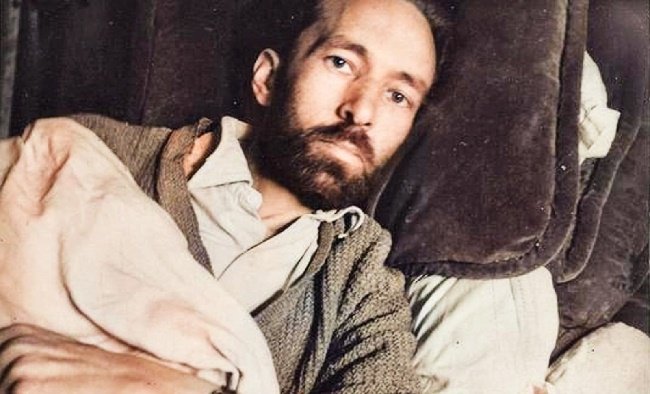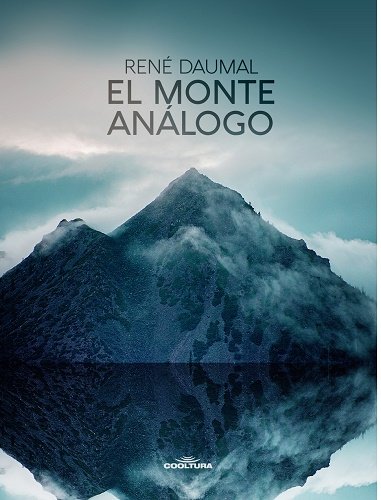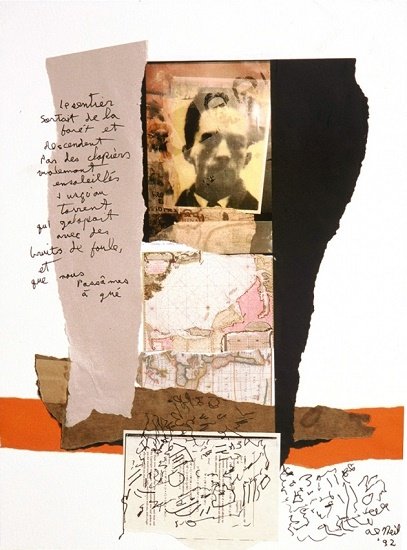René Daumal es una de las figuras más singulares de la literatura (y más allá de ella) de la Europa de la primera mitad del siglo XX. Siendo poeta, novelista, ensayista y traductor, su vida sobrepasa su obra literaria, pues se enlaza con las búsquedas extrasensoriales y espirituales, en el extremo místico. Francés, nacido el 16 de marzo de 1908, murió muy tempranamente —a los 36 años, como su admirado Arthur Rimbaud—, el 21 de mayo de 1944.

Desde sus años de juventud inició exploraciones en el campo de lo sensorial y psíquico, al plantearse ejercicios límites, cercanos a la experiencia de la muerte, y que abrían una visión radicalmente diferente de la realidad, mediante la experimentación con sustancias de alta peligrosidad, que estuvo precedida y seguida por el consumo de drogas fuertes. De su experiencia quedó un escrito de 1943, que le solicitara su amigo orientalista Jacques Masui, publicado como Un recuerdo determinante (Un Souvenir détérminant) en 1948. Esta crónica la conozco por la traducción que hiciera el geólogo y etnólogo francés Marc de Civrieux (quien viviera en Cumaná y fuera profesor de la Universidad de Oriente), aunque existe una traducción más reciente.
Reproduzco dos fragmentos de esa crónica, del inicio y del final:
Contar el hecho es imposible. A menudo traté de decirlo, desde hace 18 años de que se produjo. Quisiera, de una vez por todas, agotar mis recursos de lenguaje para referir, por lo menos, las circunstancias externas e internas. Este hecho es una certidumbre adquirida a los 16 o 18 años, y cuyo recuerdo ha orientado lo mejor de mí mismo hacia la búsqueda de los mejores medios para volverla a encontrar en forma duradera.
(...) Hacia la edad de 6 años, sin ninguna creencia inculcada, el problema de la muerte se me presentó en toda su desnudez. Pasaba noches atroces arañándome el vientre y tomado de la garganta por la angustia de la nada (...).
Y, más allá de los testimonios humanos más o menos completos (casi no hay poeta verdadero en quien yo no reencontraba al menos un fragmento), las confesiones de los grandes místicos, y más allá todavía, ciertos textos sagrados de diversas religiones, me traían la afirmación de la misma realidad; ora en forma terrífica, cuando está percibida por un individuo limitado, que no se ha hecho capaz de percibirla, que, como yo, intentó ver el infinito por el hueco de la cerradura y se ha hallado frente al armario de Barba azul, ora bajo la forma apacible, plenamente feliz e intensamente luminosa, que es la visión de los seres que se han trasformado realmente y pueden ver esa realidad, frente a frente, sin ser destruidos por ella.

Daumal estuvo muy vinculado al movimiento surrealista originario (el regido por André Breton), pero, aunque coincidía con varios de sus bases —el irracionalismo, el sueño, etc.—, no se fundió con él, sino que se mantuvo aparte con el grupo-revista El Gran Juego, junto con los poetas Rogert Gilbert-Lecomte, Rolland de Renéville y Roger Vailland, principalmente, que existió entre 1928 y 1932.
Se había iniciado en estudios de filosofía (en 1931 se licencia) y había profundizado en el conocimiento y práctica del sánscrito y del hinduismo, lo que le permite publicar artículos como "Bharata: El origen del teatro, la poesía y la música en India" o "La lengua sanscrita", entre otros trabajos. A esto se une el encuentro con el sabio de origen armenio-ruso George Gurdjieff, quien funge de maestro espiritual en lo que es el planteamiento fundamental de este: "el cuarto camino".
En su ensayo "Aproximación al arte poética hindú" leemos:
Aprendí un día de viva voz que todos esos libros no me habían ofrecido más que planos fragmentarios del palacio. El primer conocimiento por adquirir, doloroso y real, era el de mi prisión. La primera realidad por experimentar era la de mi ignorancia, mi vanidad, mi pereza, todo eso que me ata a la prisión. Y cuando de nuevo observo las imágenes de esos tesoros que la India me ha enviado, a través del velo de libros e intelecto, veo por qué esos mensajes quedan incomprendidos.

Pero lleguemos a su producción más estrictamente de carácter literario. Daumal escribió dos novelas: La Gran Borrachera, editada en 1938, y El Monte (o Montaña) Análogo, de carácter más simbólico y próxima a las enseñanzas de Gurdjieff, publicada completa, póstumamente, en 1952. En esta dice, ya hacia el final:
Con un grupo de camaradas, fui a buscar la Montaña que es la vía que une Tierra y Cielo; que debe existir en algún lugar de nuestro planeta, y que debe ser morada de una humanidad superior (...)
Su primer libro de poemas es El Contra-Cielo, publicado en 1936. De él leamos este:
La Desilusión
Blanco y negro y blanco y negro, atención, voy a enseñarles a morir, cierren los ojos, aprieten los dientes, ¡clac! Ya ven, no es difícil, no hay allí nada de asombroso.Les hablo sin pasión,
negro y blanco y negro y blanco,
¡clac! Ven que se hace rápido,
les hablo sin amor,
y sin embargo saben bien…
—hay que ser evidente hasta lo absurdo-Blanco y negro y blanco y negro y negro y blanco,
si nuestras almas intercambiaran sus cuerpos
no habría ningún cambio,
así que no hablen más de cuerpos ni de almas.Blanco, negro, ¡clac! Es la única cosa
que podemos comprender enteramente
(¿y no hay en eso nada de trágico?)Les hablo sin pasión,
blanco, negro, blanco, negro, clac,
y es mi aullido inacabable de muerto,
ese aullido blanco, ese hoyo negro…
¡Oh! Ustedes no escuchan,
ustedes no existen,
estoy solo a morir.
No puedo detenerme, para no abusar del espacio. Pero pueden percibir el obvio juego con la muerte —algo que marcó a Daumal—, con un sentido irónico, que oculta lo grave, que se concentrará en la estrofa final.
En la edición póstuma de Poesía negra, poesía blanca (1954), se incluyó su texto en prosa "Hechos memorables, del que quiero reproducir algunos fragmentos:
(...)
Acuérdate de las magias, de los venenos y de los sueños tenaces; – querías ver, te tapabas los dos ojos para ver, sin saber abrir otro.
(...)
Y acuérdate de los días que siguieron, cuando marchabas como un cadáver hechizado, con la certidumbre de ser devorado por el infinito, de ser anulado por la existencia única de lo Absurdo.
(...)
Acuérdate del hermoso espejismo de los conceptos, y de las palabras conmovedoras, palacio de espejos construido en un sótano. Y acuérdate del hombre que vino, que rompió todo, que te tomó con su tosca mano, te arrancó de tus sueños y te hizo sentarte sobre las espinas del pleno día. Y acuérdate de que no sabes recordar.
(...)
Acuérdate de los que te dicen: acuérdate. Acuérdate de la voz que te decía: no caigas. Y acuérdate del placer equívoco de la caída.
(...)
Click here to read in english
#The poetic and spiritual challenge of René Daumal
René Daumal is one of the most unique figures in European literature (and beyond it). from the first half of the 20th century. Being a poet, novelist, essayist and translator, his life surpasses his literary work, as it is linked to extrasensory and spiritual searches, at the mystical extreme. French, born on March 16, 1908, he died very early – at the age of 36, like his admired Arthur Rimbaud – on May 21, 1944.
From his youth he began explorations in the sensory and psychic field, by considering extreme exercises, close to the experience of death, and that opened a radically different vision of reality, through experimentation with highly dangerous substances, which It was preceded and followed by the consumption of strong drugs. From his experience there remained a writing from 1943, requested by his orientalist friend Jacques Masui, published as A determinant memory (Un Souvenir détérminant) in 1948. I know this chronicle from the translation made by the French geologist and ethnologist Marc de Civrieux (who lived in Cumaná and was a professor at the University of Oriente), although there is a more recent translation.
I reproduce two fragments of that chronicle, the beginning and the end:
Telling the fact is impossible. I often tried to say it, since it was produced 18 years ago. I would like, once and for all, to exhaust my language resources to refer, at least, to the external and internal circumstances. This fact is a certainty acquired at the age of 16 or 18, and the memory of which has guided the best of myself towards the search for the best means to find it again in a lasting way.
(...) Around the age of 6, without any instilled belief, the problem of death presented itself to me in all its nakedness. He spent atrocious nights scratching my belly and grabbing my throat from the anguish of nothingness (...).
And, beyond the more or less complete human testimonies (there is almost no true poet in whom I did not rediscover at least a fragment), the confessions of the great mystics, and even further, certain sacred texts of various religions, brought me the affirmation of the same reality; sometimes in a terrifying way, when it is perceived by a limited individual, who has not become capable of perceiving it, who, like me, tried to see infinity through the keyhole and found himself in front of Bluebeard's closet, sometimes under the peaceful, completely happy and intensely luminous form, which is the vision of beings who have truly transformed and can see that reality, face to face, without being destroyed by it.
Daumal was closely linked to the original surrealist movement (the one governed by André Breton), but, although he agreed with several of its bases -irrationalism, dreams, etc.-, he did not merge with it, but rather remained apart with the group. -magazine The Great Game, together with the poets Rogert Gilbert-Lecomte, Rolland de Renéville and Roger Vailland, mainly, which existed between 1928 and 1932.
He had begun studying philosophy (he graduated in 1931) and had deepened his knowledge and practice of Sanskrit and Hinduism, which allowed him to publish articles such as "Bharata: The origin of theater, poetry and music in India" or "the Sanskrit language", among others. Added to this is the meeting with the wise man of Armenian-Russian origin George Gurdjieff, who serves as spiritual teacher in what is the fundamental approach of this: "the fourth way". In "Approach to Hindu poetic art" we read:
One day I learned firsthand that all those books had offered me nothing more than fragmentary plans of the palace. The first knowledge to acquire, painful and real, was that of my prison. The first reality to experience was that of my ignorance, my vanity, my laziness, all that ties me to prison. And when I look again at the images of those treasures that India has sent me, through the veil of books and intellect, I see why those messages remain misunderstood.
But let's get to his production of a more strictly literary nature. Daumal wrote two novels: The Great Drunkenness, published in 1938, and The Analogous Mountain, of a more symbolic nature and close to Gurdjieff's teachings, published in full. posthumously, in 1952. In this one he says, towards the end:
With a group of comrades, I went to look for the Mountain that is the road that unites Earth and Heaven; that it must exist somewhere on our planet, and that it must be the home of a superior humanity (...)
His first book of poems is The Against-Sky, published in 1936. Let's read this from it:
The Disillusionment
Black and white and black and white,
Attention, I'm going to teach you how to die,
close your eyes, clench your teeth,
clack! You see, it's not difficult,
There is nothing surprising there.
I speak to you without passion,
black and white and black and white,
clack! They see that it is done quickly,
I speak to you without love,
and yet they taste good...
-You have to be obvious to the point of absurdity-
Black and white and black and white and black and white,
If our souls exchanged their bodies
there would be no change,
so don't talk anymore about bodies or souls.
White, black, clack! It's the only thing
that we can fully understand
(and there is nothing tragic about that?)
I speak to you without passion,
white, black, white, black, clack,
and it is my endless howl of the dead,
that white howl, that black hole...
Oh! You don't listen,
You do not exist,
I'm alone to die.
I can't stop, so as not to abuse the space. But they can perceive the obvious game with death – something that marked Daumal – with an ironic sense, which hides the seriousness, which will be concentrated in the final stanza.
Included in the posthumous edition of Black Poetry, White Poetry (1954), his prose text "Memorable Facts, of which I want to reproduce some fragments:
(...)
Remember the magic, the poisons and the tenacious dreams; – you wanted to see, you covered both eyes to see, without knowing how to open another.
(...)
And remember the days that followed, when you walked like a bewitched corpse, with the certainty of being devoured by the infinite, of being annulled by the unique existence of the Absurd.
(...)
Remember the beautiful mirage of concepts, and the moving words, palace of mirrors built in a basement. And remember the man who came, who broke everything, who took you with his rough hand, tore you from your dreams and made you sit on the thorns of the broad day. And remember that you don't know how to remember.
(...)
Remember those who tell you: remember. Remember the voice that told you: do not fall. And remember the equivocal pleasure of falling.
(...)
Referencias | References:
Daumal, René (s.f). Hechos memorables (Traducción: Carlos Rocha). Caracas: Fondo Editorial Pequeña Venecia.
Daumal, René (1961). El monte análogo (Traducción: Alicia Renard). Argentina: Ediciones Mundonuevo.
Daumal, René."Una experiencia integral" (Traducción: Marc de Civrieux). Oriente Universitario, año 8, nº 45, (agst-sept. 1970), pp. 19-21.
Pellegrini, Aldo (1981). Antología de la Poesía Surrealista (2º ed.). España: edit. Argonauta.
https://es.wikipedia.org/wiki/Ren%C3%A9_Daumal
https://en.wikipedia.org/wiki/Ren%C3%A9_Daumal
https://circulodepoesia.com/2016/06/poesia-francesa-rene-daumal/






Sumamente interesante. No había escuchado sobre este autor. Me alegro enterarme gracias a tu post. Saludos.
Salud estimado profesor @josemalavem.
Nuevamente, me presenta un autor desconocido para mí. Pero al menos en esta ocasión me hago una idea del personaje, no solo por su crónica, sino por haber leído algunas cosas de quien influyera en él. Gurdjieff, ese pintoresco personaje del cuarto camino y eneagrama.
Gracias por estos interesantes artículos, hasta pronto.
Esta publicación ha recibido el voto de Literatos, la comunidad de literatura en español en Hive y ha sido compartido en el blog de nuestra cuenta.
¿Quieres contribuir a engrandecer este proyecto? ¡Haz clic aquí y entérate cómo!
¡Felicitaciones!
Estás participando para optar a la mención especial que se efectuará el domingo 2 de junio del 2024 a las 8:00 pm (hora de Venezuela), gracias a la cual el autor del artículo seleccionado recibirá la cantidad de 1 HIVE transferida a su cuenta.
¡También has recibido 1 ENTROKEN! El token del PROYECTO ENTROPÍA impulsado por la plataforma Steem-Engine.
1. Invierte en el PROYECTO ENTROPÍA y recibe ganancias semanalmente. Entra aquí para más información.
2. Contáctanos en Discord: https://discord.gg/hkCjFeb
3. Suscríbete a nuestra COMUNIDAD y apoya al trail de @Entropia y así podrás ganar recompensas de curación de forma automática. Entra aquí para más información sobre nuestro trail.
4. Visita nuestro canal de Youtube.
Atentamente
El equipo de curación del PROYECTO ENTROPÍA
Gracia, amigos de @entropia.